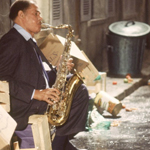 I got the distinct feeling you guys were bored to death when I did a mini-jazz series after LA LA LAND came out (reviewing MO’ BETTER BLUES and THELONIOUS MONK: STRAIGHT NO CHASER). You know, you follow your muse, and sometimes your muse is heading out north when the zeitgeist already got on a plane going south two days ago. But I’m glad I went on that kick if only because it inspired me to finally watch ‘ROUND MIDNIGHT (1986), French director Bertrand Tavernier’s beautiful tribute to the scene of American bebop players transplanted to Paris circa 1959. Real life saxophone legend Dexter Gordon plays fictional saxophone legend Dale Turner as he tries to recapture inspiration and meaning during a stretch of depression near the end of his life.
I got the distinct feeling you guys were bored to death when I did a mini-jazz series after LA LA LAND came out (reviewing MO’ BETTER BLUES and THELONIOUS MONK: STRAIGHT NO CHASER). You know, you follow your muse, and sometimes your muse is heading out north when the zeitgeist already got on a plane going south two days ago. But I’m glad I went on that kick if only because it inspired me to finally watch ‘ROUND MIDNIGHT (1986), French director Bertrand Tavernier’s beautiful tribute to the scene of American bebop players transplanted to Paris circa 1959. Real life saxophone legend Dexter Gordon plays fictional saxophone legend Dale Turner as he tries to recapture inspiration and meaning during a stretch of depression near the end of his life.
With his froggy voice, tired eyes and odd sense of humor, sixty-something-year-old Gordon’s is a non-actor performance so compelling he was nominated for the best actor Oscar. Of course he also plays live music all throughout, so Ryan Gosling wouldn’t have been as good in the role.
(The Oscar went to Paul Newman for THE COLOR OF MONEY. Herbie Hancock did win one for ‘ROUND MIDNIGHT’s score, taking out James Horner’s ALIENS and Ennio Morricone’s THE MISSION.)
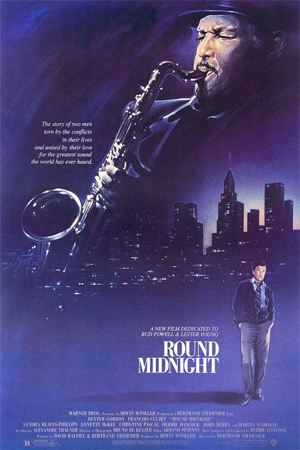 While always meaning to see this, I pictured something more like my foggy memories of BIRD, a depressing portrait of brilliant music derailed by addiction. That’s not this at all. It has a beautiful melancholy to it but it’s quirky, it’s the blues, it’s finding smiles amid the gloom. It seems very French, but more than anything its dry tone reminds me of a Jim Jarmusch movie. The cast is populated with jazz greats like Hancock, Bobby Hutcherson, Billy Higgins, John McLaughlin, Wayne Shorter, Ron Carter, Tony Williams and Freddie Hubbard, mostly for their musicianship, but also for the presence and odd speech that is different from, and for this movie better than, the smooth delivery of experienced actors.
While always meaning to see this, I pictured something more like my foggy memories of BIRD, a depressing portrait of brilliant music derailed by addiction. That’s not this at all. It has a beautiful melancholy to it but it’s quirky, it’s the blues, it’s finding smiles amid the gloom. It seems very French, but more than anything its dry tone reminds me of a Jim Jarmusch movie. The cast is populated with jazz greats like Hancock, Bobby Hutcherson, Billy Higgins, John McLaughlin, Wayne Shorter, Ron Carter, Tony Williams and Freddie Hubbard, mostly for their musicianship, but also for the presence and odd speech that is different from, and for this movie better than, the smooth delivery of experienced actors.
Though only inspired by real stories (about Lester Young and Bud Powell, told in the memoir Dance of the Infidels by Francis Paudras), there’s a strong implied history to everything. Dale is respected and liked by all the musicians of New York and Paris. He’s still good, but maybe past his prime, not gelling with his more orthodox partner Hershell (Hart Leroy Bibbs) and worried he has nothing left to offer. Part of this must come from a disastrous relationship with alcohol. As soon as he arrives he finds Butter (Sandra Reaves-Phillips, LEAN ON ME) there to scold him, keep him away from drink and hold onto his money. The bartenders all know not to serve him. He reacts not with anger but mischief, seeming to understand why they do it and that they’re not gonna let him get drunk. But he’s not gonna stop trying. Like a kid trying to get a cookie.
He starts a residency at the Blue Note, a small club located on this old-timey sound stage Paris street:
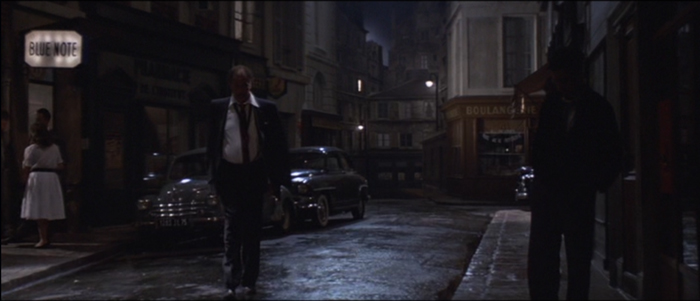
It seems like a pretty great, humble life for the staff here, hanging out on a slow night, their legs tired from standing, but getting to soak in this incredible band playing just for each other and them and a few lingering, lonely drinkers and smokers. You wish you could’ve been there.
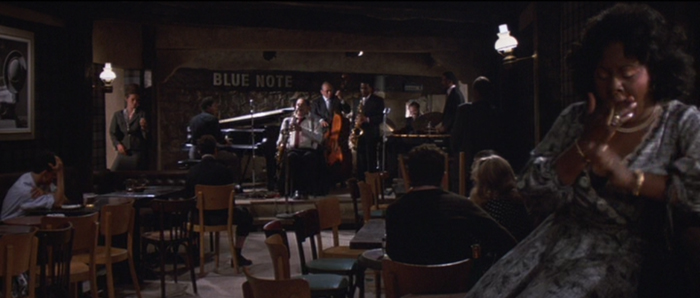
It’s kind of cryptic at first, but this is unfolding as stories told to someone named Francis (Francois Cluzet). When we meet him he’s kneeled down on the sidewalk trying to hear the music from the basement-level Blue Note. He can’t afford to get inside, but he has enough to buy Dale a beer when he sees him on the street, which gets him in on a “he’s with me” pass. Francis is a struggling movie poster artist living in a small apartment with his young daughter Beranger (Gabrielle Haker), who he leaves alone at night to go to the club. He thinks Dale is an undervalued genius and will do anything to help him.
And for a while he does. He films him, he keeps him out of the mental hospital, he brings him the bad news when Hershel dies, he brings him to live with him and his daughter, to visit his parents, dumps out his wine, searches the hospitals for him when he disappears.
Dale is a fun pain in the ass. He speaks cryptically: his only explanation for suddenly leaving New York is, “No cold eyes in Paris.” He likes to add a “Lady” in front of men’s names: “Lady Hersh,” “Lady Francis.” He seems humorless until he amuses himself and breaks into a childlike, mischievous smile.
On rare occasions he does open up about his life and troubles, and exhibits a unique wisdom. After a story about racist treatment in the service he says, “You know, it just occurred to me that bebop was invented by the cats who did get out of the army.”
When he’s locked up in a hospital he confesses to a psychiatrist that it’s overwhelming to never think of anything besides music. He describes how sometimes he looks at his mouthpiece at the end of the night and realizes it’s bloody. “My life is music. My love is music. And it’s 24 hours a day.” He tries to describe how it feels to play music in his dreams.
When Francis confesses in the taxi on the way home that he listened in from the hallway, Dale acts offended. Then he asks, “Was I good?” and gives Francis that weird smile of his.
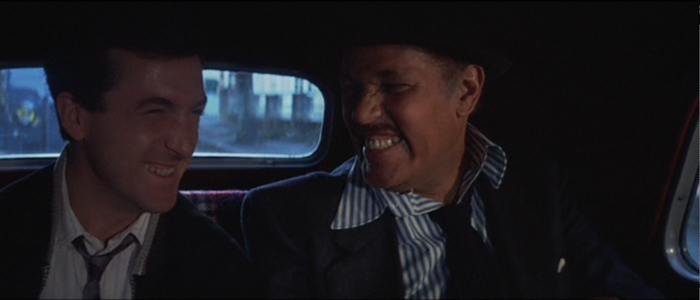
Of course, he’s not the only weirdo in his group of friends. The first person he sees when he arrives in Paris is his neighbor Ace (vibraphone legend Bobby Hutcherson), who never leaves his apartment and is always in his silk bathrobe cooking and peeking out to the hallway to offer food. But Ace understands Dale, and explains to Francis that, “When you have to explore every night even the most most beautiful things that you find can be the most painful.”
The building itself is as incredible as the club. There’s an amazing Christmas party with all these jazz legends (playing fictional jazz legends) laughing and joking and playing music together. Francis gets to be there, and even his daughter has a gigantic “I can’t believe I get to witness this!” smile on her face most of the time.
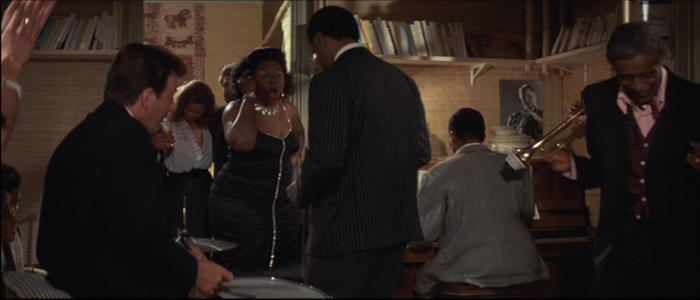
But the party can’t last forever. Just as suddenly as he left New York, Dale announces his decision to go back. “I think it’s about time for me to go home,” he tells Francis.
Of course, Francis doesn’t want to let the adventure end just like that, so he goes with him. New York feels overpowering, busier and dirtier than the idealized Paris sets, tall buildings filling in the frame so we can’t see the top of them, blocking us in, crowding us. The Frenchman tries his best to orient himself while being driven through it by a jibber-jabbering agent played by Martin Scorsese.
But he gets to see what Dale’s normal life is like. The club he plays is bigger and more full of people. One of them is his teenage daughter Chan (Victoria Gabrielle Platt, JONAH HEX, THE BAYTOWN OUTLAWS), who he never mentioned in Paris. Wishing her a happy birthday from the stage he gets her age wrong. She mutters a correction only to herself. Chan makes a good faith effort to have a relationship with her father, but seems to have long since learned not to have high expectations for him.
When all is said and done, it’s debatable whether Dale receives the recognition Francis thought he deserved. We see what seems to be some years later, with Herbie playing a tribute to Dale with an orchestra and a grand piano and shit, to what might be considered a pretty decent audience.
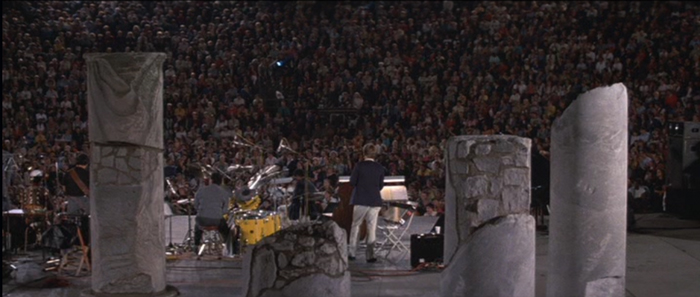
But his body rests under a little stone in a weed-covered lot, by the junked out car and the tipped over shopping cart. I doubt Chan visits often.
I guess some have described the Francis character as a “white savior.” I think it’s fair to say “Let’s have a jazz movie without a white guy’s perspective,” but I don’t think it’s fair to call it a weakness of this particular movie. The character is specifically based on the author of the book, but also reflects in general the relationship of the jazz artist with the superfan, or critic, or benefactor, or even just the artist or superstar with the worshipful non-artist. He does good things for Dale, but he has no power over him, including any power to “save” him. He is blessed to be allowed into Dale’s life, but I think he’s always an outsider, a fanboy, a servant almost. He can’t make Dale stay in Paris or leave New York. All he can do is try to document his genius, appreciate the friendship while it lasts, heed his advice to stay close to his daughter, and listen to his music.


























February 27th, 2017 at 1:38 pm
This didn’t just beat Aliens and The Mission for Original Score, it also beat Jerry Goldsmith’s Hoosiers. That choice is, frankly, a travesty; the music in Round Midnight is great, of course, but less than 5 minutes of it is actually original. Virtually all Herbie Hancock did is arrange pre-existing music. Which he did very well, but Original Score should be, you know, largely an original score.
Any of those other three would have been a great choice. (the fifth choice, Star Trek IV, is shocking, as it’s far and away the worst score of that series… and the only one after Goldsmith’s score for the first time to ever get nominated.)